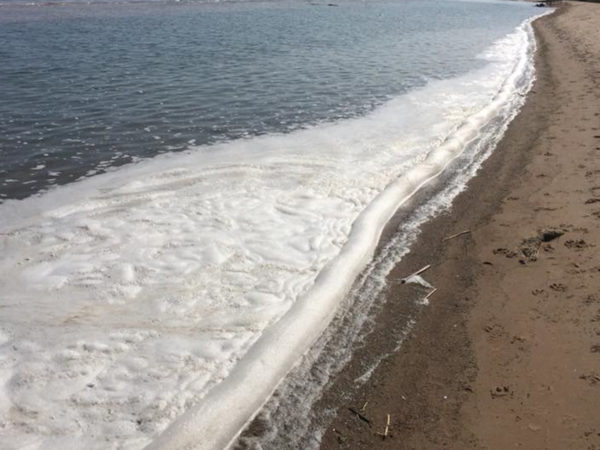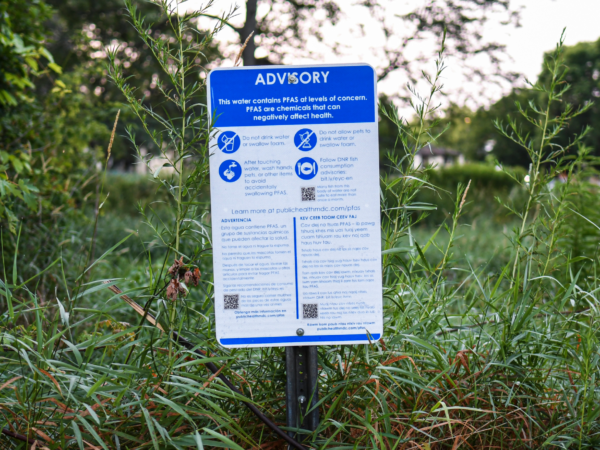
PFAS, short for per- and polyfluoroalkyl substances, are a group of widespread man-made chemicals that don’t break down in the environment or the human body and have been flagged as a major contaminant in sources of water across the country.
Keep up with PFAS-related developments in the Great Lakes area.
Click on the headline to read the full story:
Michigan:
The city will be testing for toxic chemicals at Battle Creek Executive Airport.
A $196,093 state grant was awarded to support monitoring and testing for PFAS contamination, according to the Michigan PFAS Action Response Team. Eight recipients received $1.5 million.
Battle Creek officials said the investigation will test for PFAS in the soil, stormwater and groundwater at pre-identified sites where accidents may have caused Aqueous Firefighting Foam to leak into the ground.
Wisconsin:
- Natural Resources Board delays PFAS rule in response to industry objections – Wisconsin State Journal
In response to industry pushback, Wisconsin’s natural resources policy board has delayed temporary regulations on the use and storage of firefighting foam containing hazardous fluorinated compounds known as PFAS.
The Natural Resources Board voted unanimously Wednesday to table a rule to set guidelines on containment and disposal of the chemicals.
Board members cited concerns from industry groups and Republican lawmakers objecting to the Department of Natural Resources’ proposed standards for the amount of PFAS allowed in wastewater.
- Madison water utility finds PFAS in every well; levels below proposed state health guidelines– Wisconsin State Journal
Annual testing showed hazardous chemicals known as PFAS have spread to all of Madison’s public water wells, though none were above the state’s proposed safe drinking water limits.
The Madison Water Utility released test results Friday showing total PFAS concentrations ranging from 2.5 to 47 parts per trillion in its 22 active wells.
Tests done in 2019 found contamination in only 14 wells.
United States:
- McDonald’s, Burger King, and other fast-food packaging contains toxic ‘forever chemicals,’ according to a new report – Business Insider
A study released by environmental advocacy groups Ecology Center, the Mind the Store campaign, and Toxic-Free Future last week involved testing 38 food packaging samples across six chains for PFAS. Nearly half of the samples tested positive for fluorine levels that indicated the packaging contained PFAS.
Last week, the US Food and Drug Administration announced it had reached a voluntary agreement with three major producers of food packaging to phase out the use of PFAS.
- Researcher awarded $755,000 for PFAS monitoring device – Water Quality Products Magazine
A University of Arkansas civil engineering researcher, Julian Fairey, has been awarded $755,000 from the Department of Defense. The money will help develop a new monitoring method for PFAS in water on military installations, according to the University of Arkansas.
Fairey, associate professor of civil engineering, will develop a device that can monitor the presence of PFAS in water with higher accuracy and lower costs than the traditional methods. The DoD hopes this will streamline cleanup efforts in areas where firefighting foams containing these substances have been used over the last half-century, which are high priority.
Catch up with other PFAS headlines and news from Great Lakes Now:
PFAS News Roundup: New compound in Artic seawater, Michigan and NY set new rules
PFAS News Roundup: Research suggests link with COVID-19, disposal methods increase contamination
Coping with PFAS: How have families been dealing with PFAS contamination in their communities
PFAS Progress: Michigan continues legislative push for more action against PFAS
API key not valid. Please pass a valid API key.Featured image: McDonald’s at Ohio State University, Columbus, Ohio (McDonald’s Corporation)




